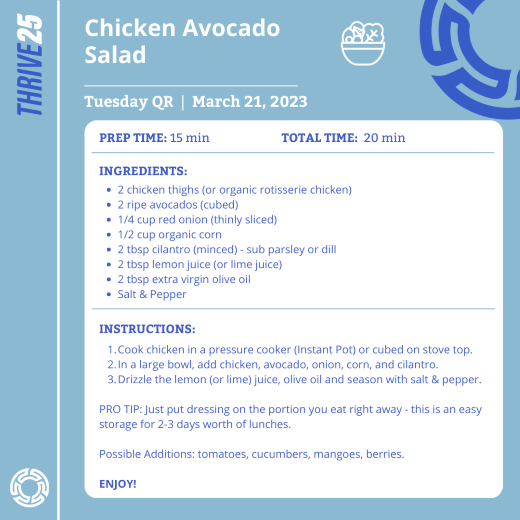Issue #152: Creatine - Good Or Bad?
Good morning. It’s Tuesday, March 21st.
Today’s Quick Win
We’ve got the last region today with the final brands competing in the 2023 Thrive25 Road to Longevity.
Today, we’re heading out West where we find non-alcoholic drinks, mushroom everything, water purifiers, meditation apps, a community of millions of bikers/runners/hikers, and a little company named after a fruit.
Check out who is playing today and don’t forget to fill out your bracket to pick your favorite brands!
From the Lab: Creatine 101
Speed Read: World Happiness Report
Tuesday QR: Hearty Salad for Lunch/Meal Prep
Bucket List: American Samoa
“Look for small victories and build on that. Even if it’s just getting up 5 minutes earlier, gives you confidence. You realize that these little victories make you feel great, and you keep going. You realize that being paralyzed by fear of failure is worse than failure.”
Number of years in a row that Finland ranks as the happiest country in the world (see Speed Read).
From the Lab
Once thought to just be for teenage athletes and bodybuilders (former governors), creatine actually seems to be a safe supplement for just about everyone.
So what is happening here? Our bodies create creatine on their own (95% in skeletal muscle). It’s not a protein and not a hormone, but it does help regenerate ATP for energy, strength, and muscle recovery.
But it’s not just for your muscles - according to Dr. Steven Gundry (who added this to his supplement stack and is hardly a body builder).
“Creatine isn’t just for building muscle. It’s also amazing for brain function. Our body naturally creates creatine, and our bodies use about 20% of it just to think. This means it’s imperative that we supplement with creatine for both our energy and our brain, since we naturally only make up half of the creatine we need.”
This is backed up by a study showing that creatine improves our short-term memory and cognitive thinking.
Creatine is also connected with DNA methylation (fancy term for how we switch on gene expression and is also used to measure our “biological age”).
Are there side effects?
I’ve scoured all the research studies and the reason creatine is included this week is that it shows positive upside for health without the downside risk.
The Cleveland Clinic, Mayo Clinic, and others say creatine is safe. An older study showed it may increase DHT (and thus hair loss) and may be problematic if you have existing kidney problems.
Dr. Peter Attia believes these studies were poorly designed and not significant - he’s also a creatine advocate.
So do you absolutely NEED to supplement with creatine?
It’s not as essential as our Core Supplements we previously mentioned in yesterday’s issue (#151). But life is lived in the margins - it’s the slightest improvements that take you from average to excellent or from surviving to thriving.
Plus, if you don’t eat much meat, are trying to do more HIIT workouts (that should be everyone), then it doesn’t hurt to make sure you have a little extra energy, better recovery, and a boost for your brain.
The consensus seems to be 5g of creatine per day (no more is necessary) - easy enough to add into your morning smoothie.
As with any supplement - you want to make sure it’s of the highest quality with rigorously tested & validated ingredients. Try Momentous as a reputable source. (Thrive25 affiliation).
As with anything - you decide how to best proceed for you.
Thrive25 Partner Spotlight
If you're like me and spend way too much on your computer, then check out breathing.ai. It's a free browser extension reminds you to take breaks, personalizes the color of your screen, and offers relaxing music to help you stay focused.
It's been an absolute game-changer for me and reminds me all day long that my health comes first - don't sit and work all day without taking care of yourself!
Download now and feel the difference!
Speed Read
Health & Longevity in the News
2023 World Happiness Report: The new report is out on happiness around the globe. Not surprisingly, the Nordic countries scored the highest again (see map view by country) - seemingly due to high levels of trust, mutual respect and support in society. The report also shows a strong link between happiness and altruism. Read full report HERE.
Not Surprising: A study was just published that eating “inflammatory foods” - basically ultra-processed stuff with tons of sugar - led to poor sleep. Everything is connected - we create either death spirals or virtuous loops when it comes to our health. (Fortune)
We Got a Sandwich Problem: Most Americans consume too much sodium, sugar and saturated fats - and sandwiches are the primary culprit. Roughly half of us eat sandwiches on any given day - so simple changes can improve health - switch your bread, skip the processed meats and watch the condiments. (WSJ)
Tuesday QR | Chicken Avocado Salad
Sometimes I struggle to figure out lunch - I end up with a scoop of PB, some berries, a handful of nuts, and then a SANS Bar. But just making this salad 1x gives you 2-3 lunches in a row full of good protein and fats. Adjust to whatever you like most - and avoid the daily sandwich crash (see above).
Bucket List | American Samoa
American Samoa is closer to New Zealand than Hawaii (two 6-hr flights from LAX). If you have the fortitude to make the trip and become one with nature, it will be worth it. The national park only had 1,887 visitors in 2022 - but boasts a unique rainforest, deep natural harbors, delicate coral reefs and miles of beaches - both rocks and sandy. There are no 5-star resorts or Michelin restaurants - but one of the last true natural escapes in “the U.S.”
Inspiration: Outside
Thanks for joining us today!
Check out the latest workout videos on our YouTube channel
Got feedback? Tell us what you think at team@thrive25.com
Want this direct to your inbox? Sign up here
Why Thrive25
We’re 40-something dads that felt our bodies and minds start to slow down and we’re not ready for that. We found too much information on every subject. So we started Thrive25 to transform what we’ve learned into something useful for the rest of us to spend just 3-5 min a day to optimize our health & longevity.
This newsletter is for you and we truly value your feedback. Never hesitate to reach out to us at team@thrive25.com.
To health!
Sign up for free:
The information in this newsletter is for informational purposes only and may not be appropriate or applicable based on your individual circumstances. Thrive25 Labs LLC does not provide medical, professional, or licensed advice. Please connect with your healthcare professional for medical advice specific to your health needs.











